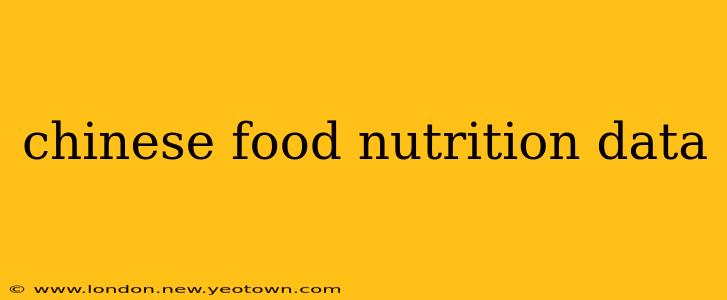Chinese cuisine, with its vibrant history and diverse regional styles, is beloved worldwide. But what's the nutritional story behind those flavorful dishes? This isn't just about calories; it's about understanding the balance of nutrients, potential health benefits, and mindful eating to enjoy this cuisine responsibly. Let's embark on a culinary journey, exploring the nutritional landscape of Chinese food.
What are the typical nutritional components of Chinese food?
This is a broad question, as "Chinese food" encompasses a vast array of dishes and regional variations. However, some common threads weave through many preparations. Many dishes feature rice or noodles as a staple carbohydrate source, providing energy. Vegetables, crucial for vitamins and minerals, often play a supporting role, sometimes taking center stage in dishes like stir-fries. Protein sources are diverse, ranging from lean poultry and fish to tofu and soy products, offering a range of amino acids. The use of soy sauce, often high in sodium, and cooking oils, which can contribute to fat content, are factors to consider for balanced consumption. The nutritional profile will vary greatly depending on the specific ingredients and cooking methods employed.
How many calories are in a typical Chinese takeout meal?
The calorie count in a typical Chinese takeout meal is highly variable and depends entirely on the specific dishes chosen and portion sizes. A single entree can range from a few hundred to over a thousand calories, while appetizers and sides quickly add up. For example, a generous portion of sweet and sour pork might easily exceed 800 calories, while a vegetable stir-fry could be significantly lower. Fried dishes generally contain more calories due to the added oil, while steamed or stir-fried options (with minimal oil) are often more calorie-friendly. Checking online nutrition databases or restaurant menus (if available) can offer some guidance, but mindful portion control is key.
Is Chinese food healthy?
The healthiness of Chinese food isn’t a simple yes or no answer. It's a matter of choosing wisely and being mindful of portion sizes. Many traditional dishes incorporate plenty of vegetables and lean protein sources, making them quite nutritious. However, the high sodium content in many sauces (like soy sauce) and the prevalent use of fried cooking methods can pose challenges for those watching their sodium and fat intake. Opting for steamed, boiled, or stir-fried dishes with less oil and sauce can significantly improve the nutritional profile. Focusing on vegetable-heavy dishes and being conscious of portion sizes is a good strategy to keep your meals healthy and balanced.
What are the health benefits of eating Chinese food?
While the nutritional value varies greatly, many aspects of traditional Chinese cuisine offer potential health benefits. The abundance of vegetables provides essential vitamins, minerals, and antioxidants. Lean protein sources, like fish and tofu, contribute to muscle building and satiety. Certain spices and herbs used in Chinese cooking may also possess anti-inflammatory or other health-promoting properties. However, it's essential to remember that these benefits are maximized when the dishes are prepared in healthier ways, with less oil and salt.
What are some healthy Chinese food options?
Healthy Chinese food options abound when you know what to look for! Steamed or stir-fried dishes with plenty of vegetables are a great place to start. Choose lean protein sources such as chicken breast, fish, tofu, or shrimp. Look for dishes described as "steamed," "braised," or "stir-fried" rather than "fried" or "crispy." Explore dishes featuring brown rice instead of white rice for added fiber. And remember, even healthy options can become less so with excessive portions. Mindful eating and portion control are essential.
Disclaimer: This blog post is for informational purposes only and should not be considered medical advice. Always consult with a healthcare professional or registered dietitian for personalized dietary advice.

